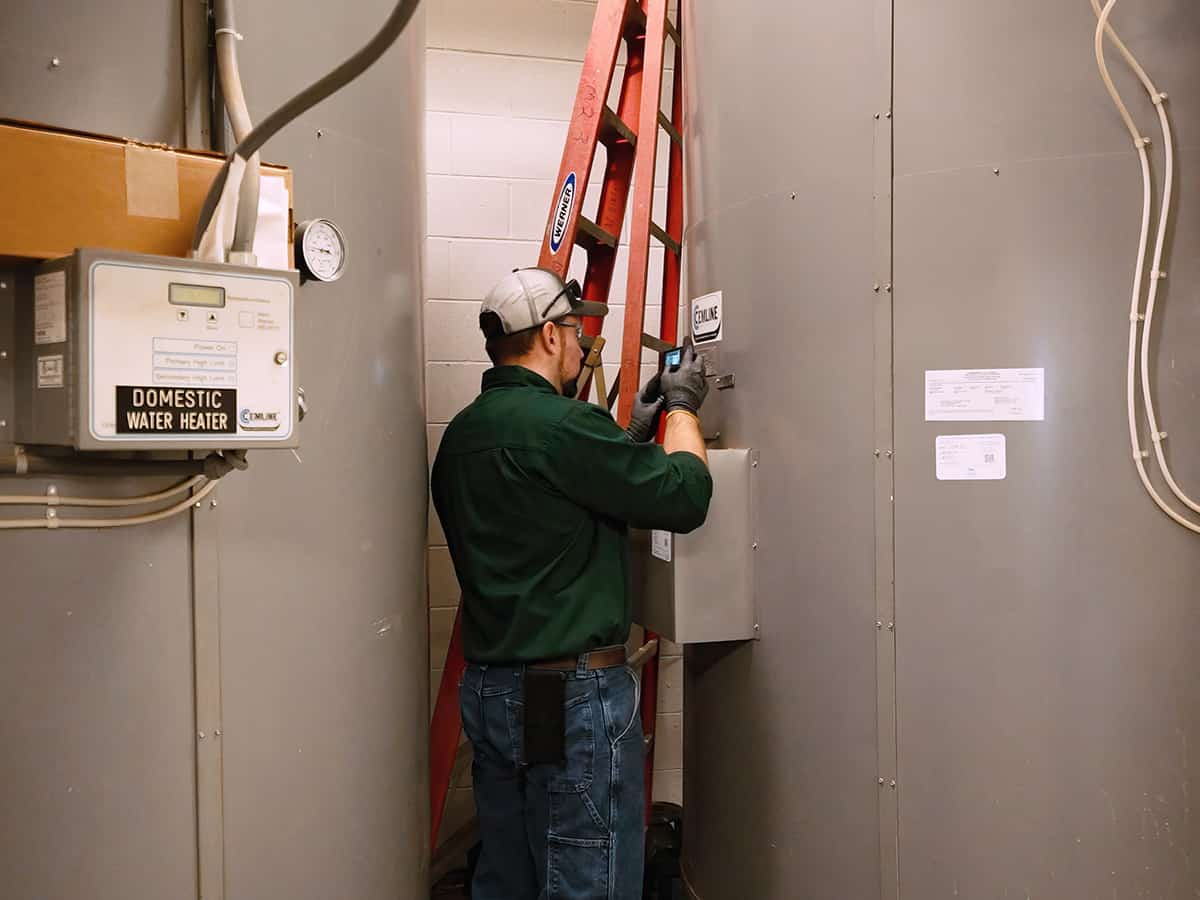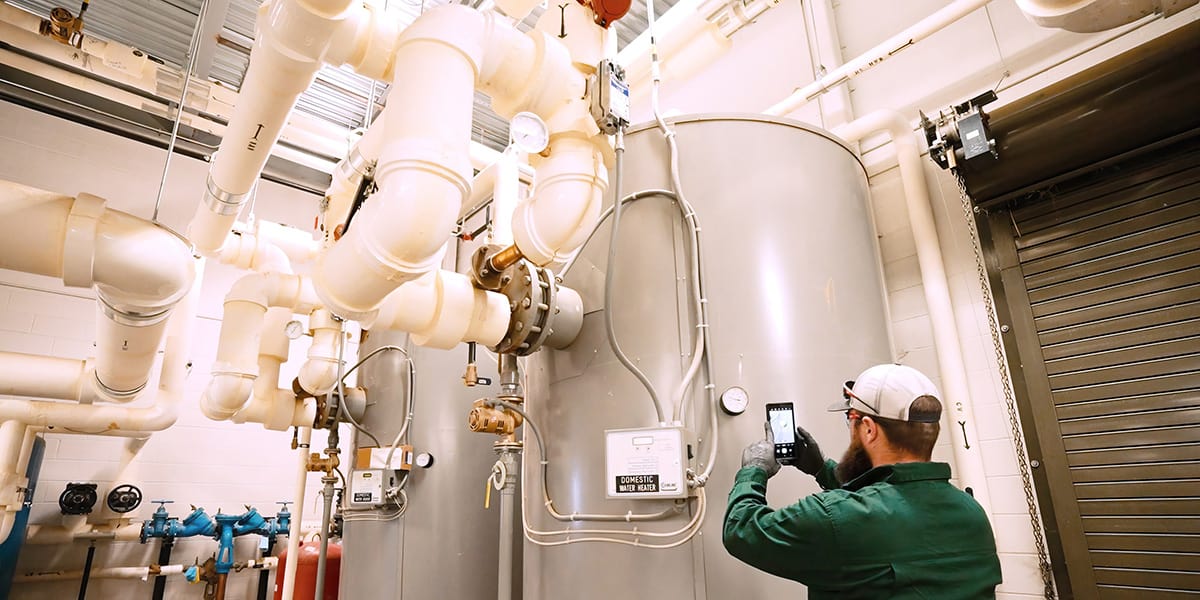Choosing the Best Commercial Water Heater for Your Facility
Categories: Maintenance | Plumbing
Whether your building's water heater is nearing the end of its lifespan or you’re in charge of choosing one for a new facility, finding the right type is integral to your day-to-day operations. Considering the average lifespan of a commercial water heater is around 12 years, facility managers need to find a water heater that will fit their facility’s needs for years to come.
With all the options available, choosing between a gas or electric water heater and deciding if you want a tank or tankless option can be challenging.
Table of Contents
Factors to Consider
Space Constraints
Before choosing a system, assess your mechanical room or installation site. Storage tank water heaters, especially high-capacity models, require significant floor space and clearance for maintenance access. When replacing an existing water heater, ceiling height and doorway dimensions can restrict options.
For space-constrained facilities, a wall-mounted tankless system can offer compact installation, often freeing up valuable square footage. However, tankless units may require upgraded venting and gas line sizing to handle demand, especially when installed in multiples.
Fuel Type Availability & Infrastructure Compatibility
Fuel type isn't just a matter of preference, it’s dictated by existing infrastructure, utility availability, and regional energy costs.
- Gas is often preferred for large facilities due to its lower cost per BTU (the energy required to raise the temperature) and fast recovery times. However, confirm gas line sizing and capacity. Many commercial tankless units require a higher BTU per hour input.
- Electric water heaters are easier to install and maintain, but you must ensure your facility’s electrical panel can handle the load, especially if installing multiple high-wattage units.

When replacing a unit, verify whether the new heater’s requirements match existing utility infrastructure or if electrical/gas upgrades are necessary.
Operational Benefits & Performance Priorities
Choosing the right commercial water heater means aligning system capabilities with your facility’s most pressing operational needs.
- Consistent Hot Water Supply: If your facility has high or unpredictable demand for hot water, choose a system with fast recovery rates and sufficient storage or output capacity.
- Energy Efficiency & Utility Cost Control: For facilities looking to reduce long-term energy expenses or meet sustainability goals, efficiency should be a top priority.
- Water Quality & Temperature Control: If your operation involves hygiene-sensitive processes or precise water temperature requirements, system control and consistency are key.
- Low Maintenance Requirements: If your team has limited maintenance bandwidth or if you want to reduce service costs over time, opt for a system known for reliability and simplified upkeep.
Cost: Upfront vs Lifecycle
Price shouldn’t be evaluated only at purchase. Consider:
- Upfront Costs: Storage tank systems typically have lower initial costs but may come with higher ongoing utility expenses due to standby heat loss.
- Lifecycle Costs: Tankless and high-efficiency models may require higher installation investments but pay off in fuel savings, lower maintenance, and longer service life.
- Incentives: Check for utility rebates, state-level energy efficiency programs, and accelerated depreciation tax benefits, particularly when installing ENERGY STAR-rated units.
Serviceability & Maintenance Resources
All commercial systems require maintenance, but how much and how often can vary significantly.
- Tank Systems typically need periodic flushing to prevent sediment buildup, especially in hard water regions. Anode rods should be inspected annually.
- Tankless Units require descaling and filter cleanings at least once or twice per year, depending on water quality and usage.
- Vent Systems (especially with gas heaters) must be checked for buildup, corrosion, or blockages that could trigger shutdowns or safety hazards.

Additionally, ask yourself:
- Do you have in-house maintenance staff, or will you rely on third-party service contracts?
- Can your building accommodate routine shutdowns, or do you need systems with modular redundancy?
Compatibility With Existing Equipment
When replacing a commercial water heater, overlooking existing specs can create serious installation issues or even code violations.
- Current equipment:
- If you’re replacing an existing electric water heater, ensure the new model matches the voltage and wattage of the old model.
- If you’re replacing an existing gas water heater, match the diameter of the exhaust vent and the fuel type with the new model.
- Electric Heaters: Match voltage (e.g., 208V, 240V, 480V), phase (single or three), and wattage to avoid circuit overload or inefficient operation.
- Gas Heaters: Ensure the flue size and material (single-wall vs. double-wall) are appropriate for the new unit’s BTU rating. Check gas line diameter and pressure; undersized piping is a common cause of underperformance.
- Storage Tanks: If retaining existing tanks or combining with new tankless systems, make sure the connections, temperature sensors, and control systems are compatible.
Performing a pre-installation site audit with a licensed mechanical contractor can help you catch these issues before they become potential problems.
Comparing Water Heater Types
Below, you’ll find information about different types of water heaters — gas vs electric and storage tank vs tankless water heater options.
Gas Water Heaters
| How it Works: | Best For: | Benefits: | Considerations: |
|---|---|---|---|
| Natural gas or propane is used to heat water | Facilities that need a reliable hot water source at a lower monthly cost |
|
|
Electric Water Heaters
| How it Works: | Best For: | Benefits: | Considerations: |
|---|---|---|---|
| Electricity from your building is used to heat water | Facilities that don’t rely on a constant hot water supply and don’t have the time to keep up with regular maintenance |
|
|

Storage Tank Water Heaters
| How it Works: | Best For: | Benefits: | Considerations: |
|---|---|---|---|
| A large physical tank continuously heats the water being stored | Facilities with a large usage of hot water that need it immediately and have space for equipment |
|
|
Tankless Water Heaters
| How it Works: | Best For: | Benefits: | Considerations: |
|---|---|---|---|
| A small unit heats water on demand without storing the water | Facilities with space limitations that need a lot of hot water, but don’t need it the second it’s requested |
|
|
Meeting the Hot Water Needs of Your Facility
Finding the right water heater ensures your facility’s water needs are met in a way that works for you. Considering the fuel type, features, costs, resources, and your building’s space and current equipment are all important when choosing a commercial water heater.
A gas water heater is suitable for a facility that needs frequent, reliable hot water, although its pipes will need access to outdoors. On the other hand, electric water heaters are great for facilities that don’t rely on a constant hot water supply but are looking for fewer maintenance needs.
Deciding on a storage tank water heater is a good choice for facilities with ample space that need a lot of hot water at a moment’s notice, but can offset the small costs of reheating the same water that isn’t used before it cools down. Tankless water heaters fit the needs of facilities with space limitations that require much hot water but don’t need it immediately and have the resources for more preventative maintenance.
Commercial Water Heater FAQs
Our Water Heater Services
RBI is a premier full-service plumbing, mechanical, service, controls, and design-build company. We provide custom services tailored to meet your needs and requirements at each stage of your building’s journey. From helping you choose the best commercial water heater for your facility to providing service and preventative maintenance for years to come, we’ve got your back.
